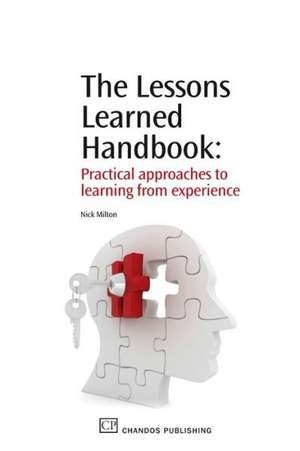The Lessons Learned Handbook: Practical Approaches to Learning from Experience
Autor Nick Miltonen Limba Engleză Paperback – 29 iun 2010
- The book is a practitioner-level guide to the design and the mechanics of lessons learned processes
- Takes a holistic approach, tracking lessons from identification to reapplication
- Makes the case for the assignment of actions for learning
Preț: 328.42 lei
Preț vechi: 423.57 lei
-22% Nou
Puncte Express: 493
Preț estimativ în valută:
62.85€ • 66.08$ • 51.93£
62.85€ • 66.08$ • 51.93£
Carte tipărită la comandă
Livrare economică 09-23 aprilie
Livrare express 12-18 martie pentru 57.95 lei
Preluare comenzi: 021 569.72.76
Specificații
ISBN-13: 9781843345879
ISBN-10: 1843345870
Pagini: 206
Ilustrații: Illustrations
Dimensiuni: 156 x 234 x 13 mm
Greutate: 0.32 kg
Editura: ELSEVIER SCIENCE
ISBN-10: 1843345870
Pagini: 206
Ilustrații: Illustrations
Dimensiuni: 156 x 234 x 13 mm
Greutate: 0.32 kg
Editura: ELSEVIER SCIENCE
Cuprins
List of figures and tables
Acknowledgements
Preface
Chapter 1: Introduction – learning lessons
Learning as a basic instinct
Learning in organisations
Lessons learned systems in organisations
How well do they work?
The value of learning lessons
Chapter 2: Elements of a lesson learning system
Lesson learning approaches in the 15th century
What is a ‘lesson learned’?
The steps in learning a lesson
Closing the learning loop
Trial and error, or trial and success?
Survey results
Chapter 3: Lessons learned approaches
Formal collect systems
Informal collect systems
Formal connect systems
Informal connect systems
A blended approach
Chapter 4: Principles of lesson identification
When to identify lessons?
The principles of lesson identification
Aiming for the ‘quality lesson’
Examples of poor lessons
Recommendation:
Stories and lessons
Self-identification of lessons versus lesson identification processes
The questioning process – the metaphor of the tree
Roles and accountabilities in lesson identification
Chapter 5: Processes of lessons identified
Post-project reviews or retrospects
After action reviews
Individual learning interviews
Learning histories
Evaluations and assessments
Incident investigation
Chapter 6: Writing down the lessons
Each lesson stands alone
The lesson needs to be easy to follow and well structured
How much context?
Who is the audience?
Attachments
Quality assurance and validation
Lessons must lead to action
Chapter 7: Taking action
Will there always be an action?
What sort of actions are needed?
How do you decide the action?
Who assigns the action?
Escalating the action
Closing lessons
Chapter 8: Process ownership and process update
Who owns the processes?
Local vs company process owners
The role of the process owner
Engagement with the learning cycle
Lessons workflow
Validation and escalation
Documenting processes
Chapter 9: Ensuring lessons and updated processes are re-applied
Broadcasting new lessons and process improvements
Process improvements and training
Process review as part of operations
Chapter 10: Technology to support lesson learning
Lesson repositories
Knowledge libraries
Publish and search technology
Tagging
Chapter 11: Sharing and seeking the unwritten lessons
Communities of practice
Peer assist
Baton passing
Knowledge handover
Promoting conversation
Chapter 12: The governance of lesson learning
A governance framework
Make corporate expectations clear
Lesson learning systems
Monitoring and measurement
The supporting organisation
Chapter 13: The principles and processes of safety investigations
What happened and why?
The investigation process
The final report
Chapter 14: Learning lessons in networks at Mars, Inc
Learn from where we are
Learn from what we know
Learn from the past six months
Formalising the learning
Summary
Chapter 15: Wikis as part of a learning system; a conversation with Peter Kemper
Chapter 16: How not to learn lessons
Chapter 17: Conclusions
Index
Acknowledgements
Preface
Chapter 1: Introduction – learning lessons
Learning as a basic instinct
Learning in organisations
Lessons learned systems in organisations
How well do they work?
The value of learning lessons
Chapter 2: Elements of a lesson learning system
Lesson learning approaches in the 15th century
What is a ‘lesson learned’?
The steps in learning a lesson
Closing the learning loop
Trial and error, or trial and success?
Survey results
Chapter 3: Lessons learned approaches
Formal collect systems
Informal collect systems
Formal connect systems
Informal connect systems
A blended approach
Chapter 4: Principles of lesson identification
When to identify lessons?
The principles of lesson identification
Aiming for the ‘quality lesson’
Examples of poor lessons
Recommendation:
Stories and lessons
Self-identification of lessons versus lesson identification processes
The questioning process – the metaphor of the tree
Roles and accountabilities in lesson identification
Chapter 5: Processes of lessons identified
Post-project reviews or retrospects
After action reviews
Individual learning interviews
Learning histories
Evaluations and assessments
Incident investigation
Chapter 6: Writing down the lessons
Each lesson stands alone
The lesson needs to be easy to follow and well structured
How much context?
Who is the audience?
Attachments
Quality assurance and validation
Lessons must lead to action
Chapter 7: Taking action
Will there always be an action?
What sort of actions are needed?
How do you decide the action?
Who assigns the action?
Escalating the action
Closing lessons
Chapter 8: Process ownership and process update
Who owns the processes?
Local vs company process owners
The role of the process owner
Engagement with the learning cycle
Lessons workflow
Validation and escalation
Documenting processes
Chapter 9: Ensuring lessons and updated processes are re-applied
Broadcasting new lessons and process improvements
Process improvements and training
Process review as part of operations
Chapter 10: Technology to support lesson learning
Lesson repositories
Knowledge libraries
Publish and search technology
Tagging
Chapter 11: Sharing and seeking the unwritten lessons
Communities of practice
Peer assist
Baton passing
Knowledge handover
Promoting conversation
Chapter 12: The governance of lesson learning
A governance framework
Make corporate expectations clear
Lesson learning systems
Monitoring and measurement
The supporting organisation
Chapter 13: The principles and processes of safety investigations
What happened and why?
The investigation process
The final report
Chapter 14: Learning lessons in networks at Mars, Inc
Learn from where we are
Learn from what we know
Learn from the past six months
Formalising the learning
Summary
Chapter 15: Wikis as part of a learning system; a conversation with Peter Kemper
Chapter 16: How not to learn lessons
Chapter 17: Conclusions
Index
Recenzii
"The book is very practical and contains lots of advice, justified, how to perform each of the steps suggested in the process of lessons learned." --Knowledge Management and Organizational Learning"Valuable case histories of real-life events pepper the chapters, which systematically outline and summarise all the key steps and alternatives in the process in a clear, easy-to-read manner." --Australian Academic and Research Libraries





